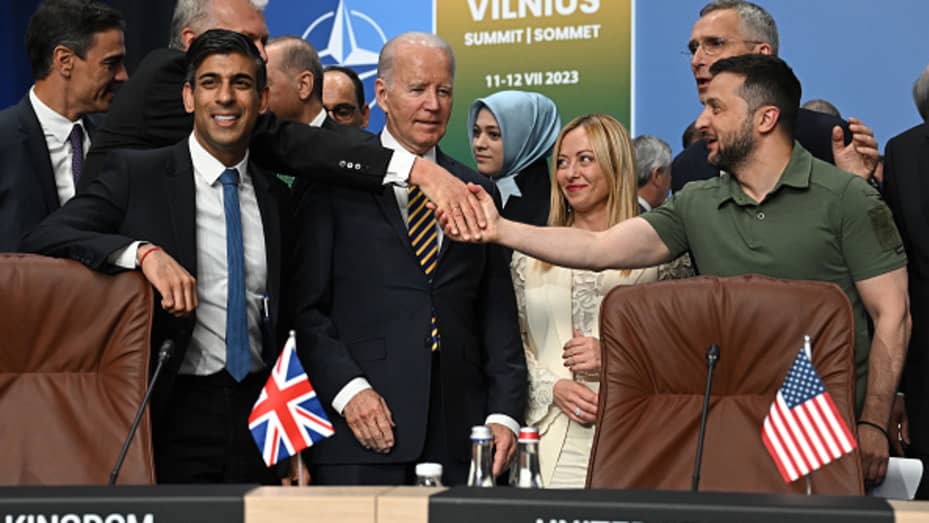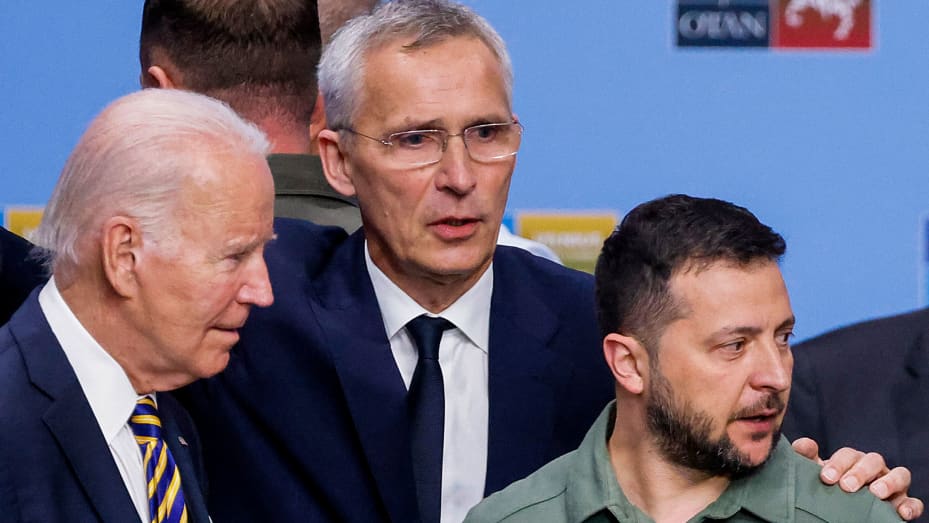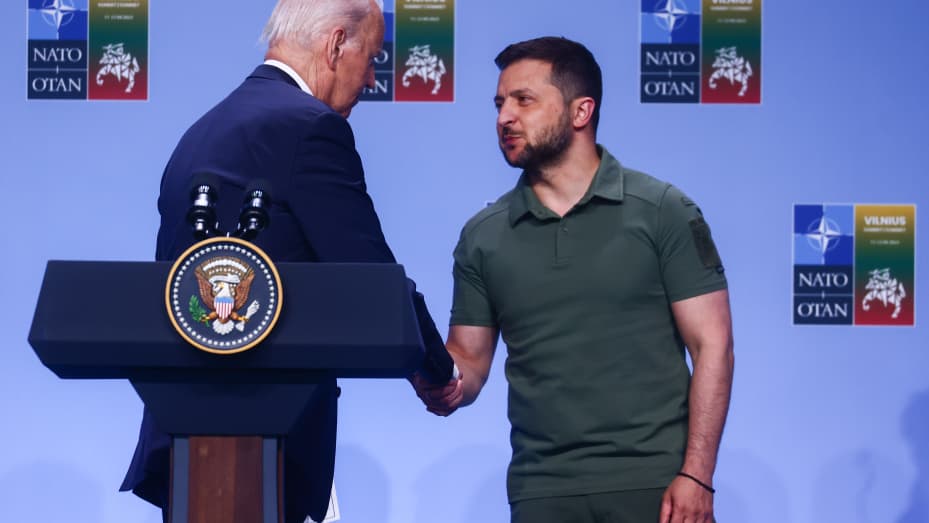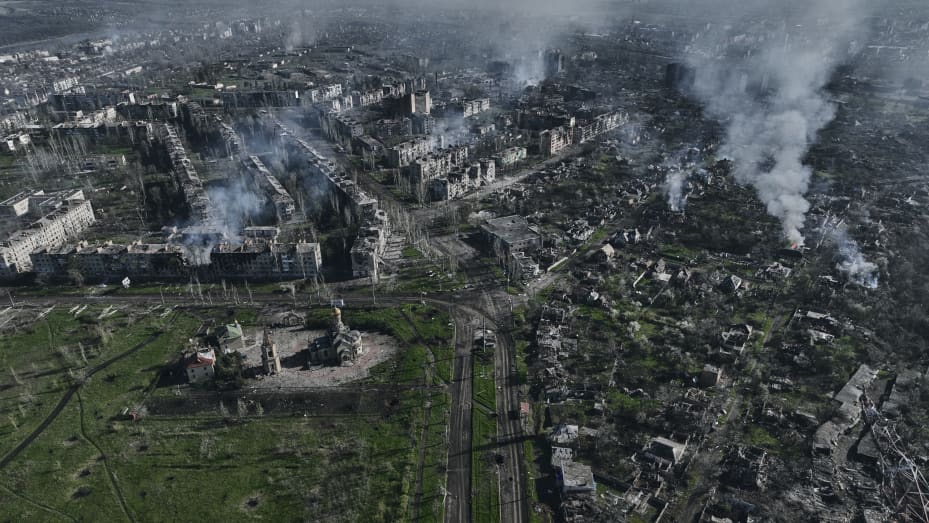Holly Ellyatt

As the war with Russia has played out, it’s been inevitable perhaps that there have been tensions and differences of opinion between Kyiv and its allies.
Ukraine has to tread a fine line with its international friends.
It’s reliant on its partners for billions of dollars’ worth of military hardware and assistance but insists it’s fighting the West’s war too.
Most recently, tensions have emerged over Ukraine’s military strategy and demands on NATO.
A meeting of the NATO-Ukraine Council during the NATO summit on July 12, 2023, in Vilnius, Lithuania.
Ukraine’s relationship with its international partners has become increasingly complex, and it was perhaps inevitable that tensions and differences of opinion between Kyiv and its allies arose as the war with Russia dragged on.
Ukraine has to tread a fine line with its international friends. It is reliant on its partners for billions of dollars’ worth of military hardware, as well as other forms of humanitarian and financial assistance, and it needs a continuous and increasing supply of arms to fight Russia. It insists, however, that it is fighting not only for its own survival but for the West, too, facing a hostile and unpredictable Russia.
Kyiv’s biggest individual benefactors like the U.S. and U.K., who have given more than $40 billion and $4 billion in security assistance to Ukraine, respectively, have pledged to support Ukraine till the end. The phrase “whatever it takes” has become a mantra often repeated at public gatherings of allies assessing the war and the military needs of Ukraine.
Kyiv has repeatedly thanked its partners for their help but, behind the scenes, frustrations have also come to a head and Ukraine’s ongoing needs and demands — and the military and political considerations of its allies — have clashed at times, prompting uncomfortable encounters.
Most recently, tensions have emerged over Ukraine’s military strategy and demands on NATO. Ukraine’s president, Volodymyr Zelenskyy, is said to have angered some allies ahead of the most recent NATO summit in Vilnius, Lithuania, in July, when he described the lack of a timetable over the thorny issue of alliance membership, and “conditions” that needed to be met before an invitation to join was issued, as “absurd.”
Frustrating Washington, London
For some officials in Washington and London, Zelenskyy’s decision to tell his staunch backers that Ukraine deserved “respect,” as NATO met to discuss additional support for Kyiv, was a step too far.
Britain’s defense secretary, Ben Wallace, perhaps unburdened by his forthcoming departure from the role, took umbrage at Zelenskyy’s comments, saying Kyiv should be mindful of war fatigue and skeptics among its allies questioning the massive amount of continued funding. The U.K., for one, he said, was not an Amazon warehouse that could supply endless weaponry to Kyiv when it was given a “shopping list.”

(From L) US President Joe Biden, NATO Secretary General Jens Stoltenberg and Ukraine’s President Volodymyr Zelensky talk ahead of a working session on Ukraine during the NATO summit, in Vilnius on July 12, 2023.
Needless to say, Zelenskyy’s comments didn’t go down well in Washington either and The Washington Post reported sources noting that U.S. officials had been so roiled that they had briefly considered watering down what Kyiv would be offered at the summit.
“The comments made by Zelenskyy before the last summit did not really resonate well in Washington ... the U.S. administration was very annoyed,” a source with knowledge of the matter who asked to remain anonymous due to the sensitivity of the situation, told CNBC.
The source noted that Washington had also been vexed by other episodes in the war in which Ukraine had seemingly ignored its advice, making the NATO episode more frustrating for the White House.
“So the U.S. is strongly advising Ukraine not to do certain things, but Kyiv does them anyway, brushing aside or not addressing U.S. concerns. And they come at the United States, or Washington or the Biden administration, complaining about not being involved in NATO talks,” the CNBC source said.
In the end, the NATO alliance stood firm behind Kyiv and stressed its unity, keeping its eyes on the bigger objective: ensuring Russia does not “win” the war against its neighbor and becomes emboldened to attack other former Soviet republics. Still, the episode highlighted Ukraine’s need to tread a fine line between the demands and pressures it places on its allies and appreciating its partners’ own perspectives, priorities and political considerations.
Managing expectations
Drawing on his own experience of working in NATO, Jamie Shea told CNBC that support for Ukraine among its allies remains strong but that the Vilnius summit had highlighted points of vulnerability, and the need for diplomacy and compromise.
“I think you always have to distinguish between the strategic level and the tactical level, and at the strategic, geopolitical level then Western support for Ukraine is still remarkably solid,” said Shea, former deputy assistant secretary general for emerging security challenges at NATO and an international defense and security expert at think tank Chatham House.
″[But] obviously, at the tactical level, inevitably there are going to be problems and there have been, around the time of the NATO summit there were some some issues, there’s no doubt about that.”
Shea said Zelenskyy would have known that NATO would not be able to accede to Kyiv’s demands for a timetable on membership, or an invite to become a member of NATO while the war is ongoing. And by threatening to boycott the summit, Zelenskyy had played a risky strategy, Shea noted, potentially setting the meeting up for failure.

U.S. President Joe Biden and President of Ukraine, Volodymyr Zelenskyy shake hands during G7 Declaration of Joint Support for Ukraine at LITEXPO Lithuanian Exhibition and Congress Center in Vilnius, Lithuania on July 12, 2023.
In the end, cooler heads prevailed: “The United States and the NATO allies worked overtime to convince him that he should look at the glass half full and at all the things that he was getting,” Shea noted.
“As it turned out, Zelenskyy got the message, he turned up in Vilnius and I think his advisors, because he has good advisors, told him that it wasn’t helping Ukraine and that ‘we can’t snub the only guys that are keeping us alive in terms of weapons and support.’”
Shea noted that Ukraine’s position was a difficult one, however, and that there’s bound to be a gap between what the Ukrainians want and what the West is able to provide “and occasionally, that’s going to boil over into frustration.”
“The Ukrainians are in a difficult situation. Obviously, they’re playing for their existential survival, they’re always going to be unsatisfied in terms of needing more and more more the whole time. [Meanwhile] the West will always consider that it’s doing its best. ... The key thing is to manage that [discrepancy] and prevent it doing lasting damage, and I think the Vilnius summit at least managed to prevent it doing lasting damage.”
Bakhmut
It’s not only at a diplomatic level that Ukraine has irked its allies. Ukraine’s military strategy — and the symbolic value it has put on fighting for every piece of Ukrainian territory — has sometimes collided with its allies’ military perspective and pragmatism.
Kyiv is believed to have annoyed the U.S. when it decided to continue fighting for Bakhmut, a town in eastern Ukraine that has found itself at the epicenter of fierce warfare between Russian and mercenary forces and Ukrainian troops for more than a year.

Smoke rises from buildings in this aerial view of Bakhmut, the site of the heaviest battles with Russian troops, in the Donetsk region of Ukraine on April 26, 2023.
Almost surrounded by Russian forces who then claimed to have been captured Bakhmut back in May, military analysts questioned whether Ukraine would, and should, beat a tactical retreat from the town that was not deemed of strategic value. Ukraine decided to fight on, however, with that decision causing consternation in the U.S., according to Konrad Muzyka, a military intelligence specialist and president of Rochan Consulting.
“The Americans were encouraging, to put it mildly, the Ukrainians not to fight certain battles in the way that Russia wanted them to fight, as it could have long-term consequences in terms of manpower losses and artillery ammunition expenditure. However, for Kyiv, Bakhmut was more than a city. It was a symbol of Ukrainian defiance even though its strategic value was questionable,” Muzyka told CNBC.
″[But] the result is that they’ve lost a lot of men, and very experienced personnel as well. They expedited a lot of artillery munition, which would otherwise be used for this counteroffensive, and lastly, they burned out a lot of barrels for their guns, meaning they are unable to fully support their forces in the Bakhmut area.”
Retired British Gen. Richard Barrons defended Ukraine’s approach to Bakhmut, telling CNBC that, domestically, “Bakhmut matters” for Kyiv. Defending the town appeared to be part of Ukraine’s wider “starve, stretch and strike” strategy, the former commander of the U.K.’s Joint Forces Command noted, in which it sought to wear down the Russian occupiers, attacking reserves, ammunition supplies and logistics, and to stretch Russian forces along the 600-mile front line.
Now, anticipation is rising for the “strike” part of the strategy with speculation mounting that Ukraine has just started to commit a portion of its reserve forces, including NATO-trained and NATO-equipped brigades, for a big push in an attempt to break through Russian defenses in southern Ukraine.
“We think we are about to see, but not necessarily, that uncommitted force being committed in an attempt to make a major inroad into the Russian occupation,” Barrons said, but he added that Ukraine should resist pressure from its allies to produce quick results, or to commit such forces before the conditions are right.
“Ukraine feels under pressure from his Western backers, to show progress in this counteroffensive, to prove to itself and the rest of us that this war can be won on the battlefield,” he said.
“But a sounder approach is to do things when when the time and timing is right. The very worst outcome for Ukraine would be that they would take this uncommitted force and batter it to pieces on the front end of Russian fortifications they’ve not been able to break through. That would be a tragedy for the people taking part and a tragedy this year for the Ukrainian campaign.”
No comments:
Post a Comment